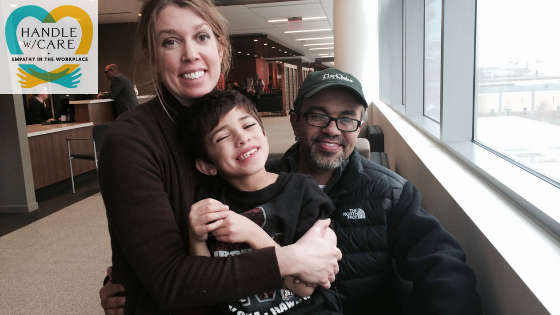My husband had a brain injury: the challenge of long-term disability. An interview with Bess Malek-Maiorano
/In a moment, everything can change. A traumatic brain injury dramatically altered life for Baher Malek, a software designer, and his family. Bess Malek-Maiorano speaks about the exhaustion of providing long-term care, the shock of injury, and the challenge of embracing long-term disability. Listeners gain perspective and actionable tips on how to help those coping with the reality of extended care for someone that is not going to get better.
You can listen to the entirety of the podcast here. Handle with Care can also be found on Spotify, Google Play, and iTunes
The Malek family before Baher’s injury
I emerged from the story of Bess and Baher with an appreciation for how their story continues to unspool. Baher needs ongoing care and his family continues to need all manner of social, emotional, and physical support as well. Here are three action points for those that support individuals with disabilities and long-term care needs.
In the words of Bess, just continue to open doors for people in crisis. Perhaps that is helping with paperwork, volunteering to drive to after-school practices, delivering meals, or giving gifts.
As an employer, be aware of the pressure to perform that you are placing on employees that are in times of stress. As you can offer grace, do so! Ask yourself, do I need to make a big deal of this forgotten badge? Can I allow this person to take ten minutes to compose themselves? Each gesture of kindness extends humanity and conveys value to your employee
Long term disability extends over years. How can you, as a supporting organization or individual, continue to check-in over time, offering support, asking how the person is doing? Can you offer a point person to coordinate care? You will have to plan for this and build it into your calendar because, in the tyranny of the moment, it will be easy to lose sight of being supportive for the long haul. Many people have short attention spans and your capacity to be there and be with a person over time speaks volumes.
Waiting for a visit with neurology
Here are some additional excerpts from the conversation:
Your presence and your absence matter
14:07 - Bess Malek
I think the people who showed up at some point was really important. And their absences, the absence of people that I thought would be there was an additional loss and grief that was acutely painful and you see the vacant places that you thought would be filled and and God brings other people, but you really remember that and wish that they had just acknowledged and been present for something.
A point person is tremendously helpful
19:14 - Bess Malek
I also was thinking of how beneficial it could be if you had a point person at your work who could coordinate with maybe other supports around your family. Like, if you had a one person who knew me well at work who could then coordinate with either church community or neighborhood or family so that you're not, you know, doing, you know ,you're not replicating care or you're not letting holes be there. Could be a really powerful and efficient way to care for people better. And it doesn't have to be really formal through the department. It could just be that maybe management makes sure or co-workers make sure that somebody is kind of the point person and can communicate things that as they evolve.
Help with the overwhelming amount of paperwork
20:13 - Bess Malek
I had a friend who took the time, and this is where I think people could really help in a practical way. This was in regards to counseling but it could apply to any paperwork that needed to get done. She took the time to print it all out, to sit down with me and help me fill out what she could. That handholding is the only way I could do another piece of paperwork. And I think when employers just kind of give you a link, that they could do a little more if you're actually in crisis just to help you see forward when it's difficult.
Too much pressure can be crushing; give grace as you can
24:35 - Bess Malek
I felt an enormous pressure to perform on every level. There were times I would go from work to the other hospital in a snowstorm, you know, with baby sitters at home till late at night. I really struggled when I felt like people were quick to jump on a 10 minute late gap in my performance or little things that, you know, you forget a badge. I remember one time I forgot my badge and I couldn't scan in and I felt like one particular co-worker who was more of a grudging spirit really made that a big deal. And I just dissolved. I just, it was just one more area that I felt like I couldn't make it work. I couldn't be enough or, and it was such a small thing. And so I think having grace for the tiny things, that really people can cover over is something that is so helpful. Or saying it's not a big deal or take a few minutes and go have some time you know in just 10 minutes to yourself to go get a drink and compose yourself.
It can be important to take time off
28:09 - Bess Malek
I think that taking time off is something that I wish I would have done more intentionally, maybe after some of the adrenaline. I even thought about taking time off this past fall to process a little more. And, I wasn't ever very well invited to do that. Nor did I know if it would be helpful, necessarily. But I think. If people helped open doors.
The Malek children visit Baher



